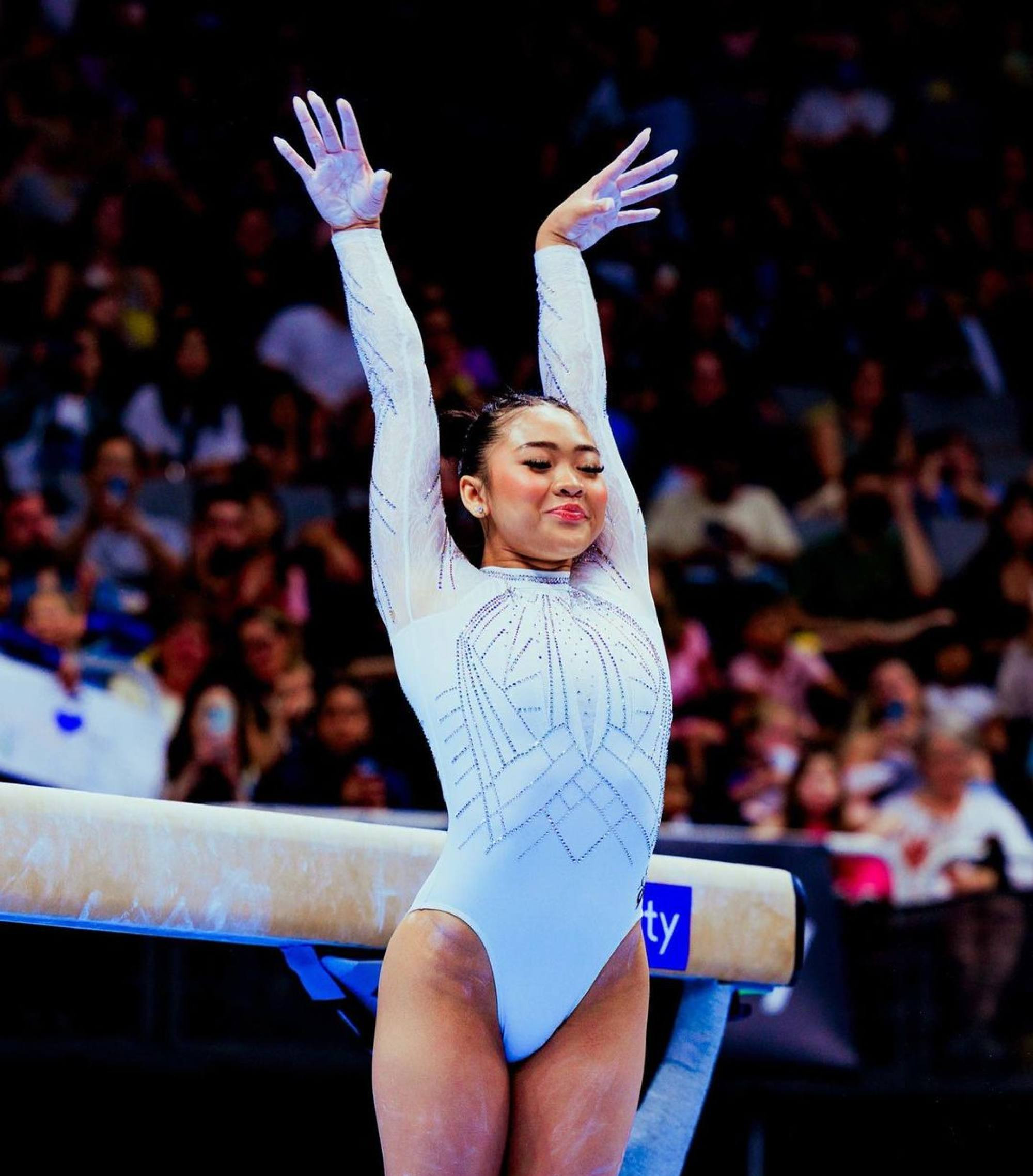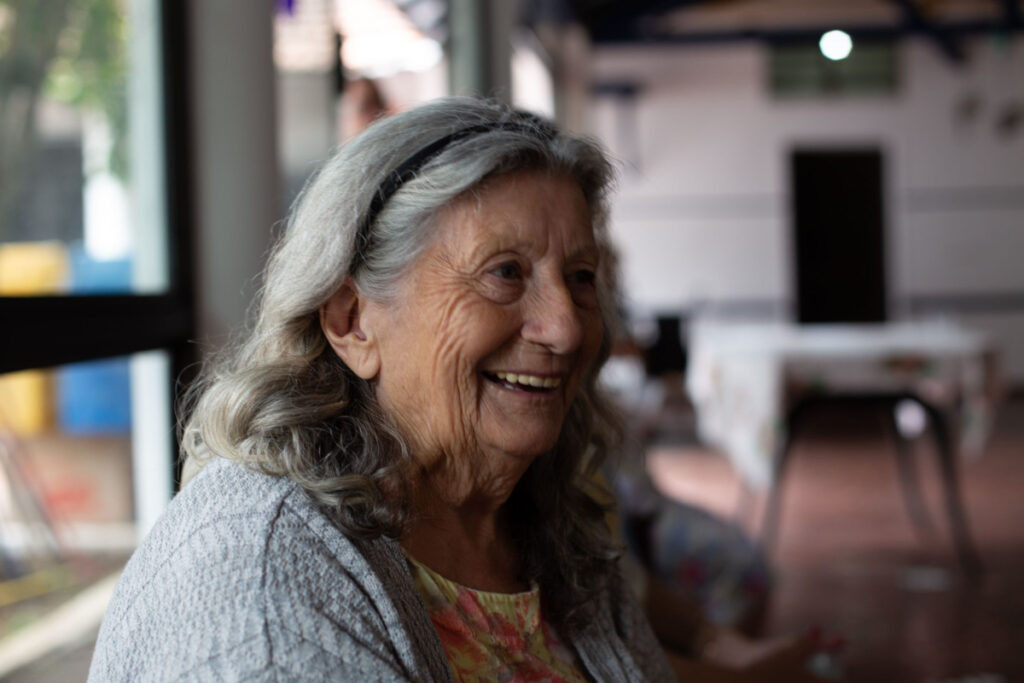The battle for the gold, silver, and bronze medals in the women's all-around finals at the 2024 Olympics came down to the floor routine. Simone Biles bested the competition, beating out Brazil's Rebeca Andrade for the gold, and 2020 all-around gold medalist Suni Lee fought to end up on the podium on Aug. 1.
Lee, 21, said on TODAY Aug. 2 that she was "in shock" when she learned her floor routine score would give her the bronze medal.
"I didn't think that I was going to be able to podium," Lee recalled. "So like coming in my floor routine, I literally told myself like, you know, we're just going to end it off the right way and I'm just going to do everything that I can to just finish it off, because being here is an accomplishment itself."
Going into her floor routine, her final rotation, Lee was tied for fourth and her competitors were fractions of a point away from each other. Before getting on the floor, Lee was seen reciting affirmations and mantras.
"Mind over matter," NBC Olympics captioned a video of Lee reciting words to herself ahead of doing her floor routine.
After giving her final salute, the judges sent in a score of 13.666, meaning Lee would make it on the podium.
"I honestly started getting a little bit emotional. I don't know if you can tell, but I like almost started tearing up," Lee told TODAY's Savannah Guthrie and Hoda Kotb of what she was thinking after she finished her routine. "But I was just like, so happy."
"I came off and my coach was like, 'I told you.' He was like, 'I knew you could do it.' And he's like, 'I'm just so proud of you,' because he's like, 'I will always bet on you,'" Lee continued. "It means so much."
Lee's teammate Biles won the all-around competition with a combined score of 59.131, with Andrade at 57.932, and Lee with 56.465. Lee shared how Biles was doing after a spectacular night.
"I think she's feeling amazing. I mean, it's kind of surreal, I guess coming from the last Olympics and dealing with everything that she's had to — she's been such a role model and inspiration," Lee said. "I told her right when she got off like, 'You did it.'"
Lee's Remarkable Comeback
As little as an hour before Suni Lee stood on the third step of the Olympic all-around podium, Jess Graba couldn’t imagine this moment.
In December, the coach’s star pupil was “rotting” in her bedroom, mourning the gymnast she used to be and uncertain about the woman she would become after two kidney diseases morphed her body beyond recognition. On the first day of August, Lee was an Olympic all-around medalist again.
“Not many people train for seven months for a medal,” Graba said. “Nobody does. Only her.”
Lee’s miraculous comeback continued Thursday in the women’s all-around final where she took the bronze medal. Although she qualified in third place, had the third-highest difficulty score in the all-around final field and had just helped the United States win gold in the team competition, Lee spent much of Thursday telling others she wouldn’t medal in the all-around. She walked out of Bercy Arena with her fifth Olympic medal in hand.
“I wanted to just prove to myself that I could do it,” Lee said, “because I didn’t think that I could.”
Joining gold medalist Simone Biles on the podium, the stars became the first U.S. women to win two Olympic all-around medals. Three years ago, Lee was the one on the top step. Biles, struggling with a mental block that prevented her from being able to control her body in the air, cheered from the mostly empty stands in Tokyo.
A Difficult Journey Back
A lot has changed for both since then.
“It was great to be out there with her,” Lee said Thursday, “and do it the right way this time.”
The longtime teammates kept each other calm during a nervy meet. Biles, the most decorated gymnast in history, was sweating out the 1.199-point margin of victory over Brazilian star Rebeca Andrade, who won her second consecutive Olympic all-around silver medal. Between routines, Biles and Lee talked about the scores that they needed. They gave up when they realized they were never going to win medals in mental math.
Instead Graba, who has been coaching Lee since she was 6 years old, told her plainly: Whoever wins floor, wins the bronze medal.
“So,” he added, “go win floor.”
Lee nailed her first tumbling pass, a difficult double-flipping layout with a full twist. Her jaw dropped.
The other bronze medal contenders, Italy’s Alice D’Amato and Algeria’s Kaylia Nemour, left the door open. D’Amato stepped out of bounds on her first tumbling pass, a 0.1-point deduction. Nemour landed short on her last pass and took a large step forward.
Lee had the highest floor score of the three to win bronze by 0.123 points.
“She’s just such a fighter,” Graba said. “I always bet on her. I told her that too: I’ll always put my money on you, because you always fight.”
When she woke up one morning last year with her face swollen beyond recognition and her joints unable to move, Lee was panicked. The culprit, doctors found, was a pair of kidney diseases that, had they gone untreated, could have led to kidney failure. She worked for months to find appropriate treatment.
A Fight For Her Future
The results were inconsistent. She teased a video online in January of a never-before-competed full-twisting release skill on bars. Other days she couldn’t even fit her fingers into her grips to hold the bar at all. She and her coaches never knew how her body would react on a given day.
Already having gotten a taste of what life could be after gymnastics when she went on her post-Tokyo publicity tour, she thought about quitting constantly. She could eat all the delicious food her mom cooked, gorge on pizza while taking vacations with friends and never have to miss anything because of practice.
Only a few months ago, she called Graba and said she was done. He wasn’t going to fight her, he responded, but at least come into the gym to talk about it.
“I was gonna let her quit,” Graba said. “If that’s what she needed, and that’s what made her healthy, I would have been fine with it. But I thought she would regret it.”
The path back was slow. Her performance at U.S. championships three months ago was her first all-around competition at an elite meet since Tokyo. Lee would get discouraged when she went to the gym because she remembered the 2021 Olympic champion. She missed her.
“I’m never gonna be the same,” Lee said earlier this year. “I’m not the same Suni, not the same athlete. And [my coaches said], ‘Good. You don’t want to be.’”
Lee, who said her kidney diseases are in remission, has worked regularly with a therapist during her comeback. The experience has taught her she is “a lot stronger than I think,” Lee said after making the Olympic team.
After the floor routine that made her an Olympic champion in Tokyo, Lee shuffled off the podium with a concerned look on her face. She and Graba were “trying to accomplish stuff” in that Olympics. Lee held her all-around gold medal up with a tight-lipped smile.
In Paris, they’re just happy to be here. Lee beamed during her floor routine and flashed a toothy grin while waving to the crowd as she walked off. She hadn’t even heard her score yet.
“The smile,” Graba said, “is the real reason you do it.”
Suni Lee's Advocacy for Kidney Health
The American Kidney Fund teamed up with the Olympic gold medalist for their new Know Your Kidneys initiative.
That’s why she recently teamed with the American Kidney Fund (AKF) for its Know Your Kidneys initiative, a program that educates the public on kidney disease, directs patients to available treatment options and supports them in their fight against kidney disease.
Upon the onset of symptoms, Lee had no knowledge about kidney disease. Eventually, she received a diagnosis after numerous tests, though the origin of her disease remains unknown.
This is not an uncommon experience for patients, as nearly half of people living with kidney disease are unaware they have it. Additionally, up to 15% of people with kidney disease do not know the cause of their disease.
“Getting diagnosed with kidney disease turned the world that I knew upside-down. At the time of my diagnosis, I was 20 years old, competing in a sport that I love so much. My kidney disease has been difficult, and I know firsthand that sometimes the cause of your disease isn’t clear-cut,” she said. “But I want to encourage others to be informed about their kidney health and become a self-advocate for a treatment plan that can allow them to live their best life. I’m thrilled to work with the American Kidney Fund and I’m looking forward to getting started.”
The partnership with the AKF marks yet another medical marketing play from Lee during the Olympics. She and Biles are among the seven athletes sponsored by Eli Lilly and Company during the multi-week competition. She has also been featured in ads for Lilly discussing her bouts with eczema.
As part of the Know Your Kidneys initiative, AKF is promoting its personalized roadmaps for patients to ensure they receive better care and feel empowered to take control of their health and wellbeing.
AKF CEO LaVarne A. Burton said in a press release that the organization was eager to work with Suni, citing her resilient patient journey and connection with young viewers.
“With Suni using her platform to encourage people to know their kidneys, know their cause, and know their plan, we can make an even stronger impact,” Burton added. “Increasing awareness about the impact kidney disease has on people of all ages — and encouraging people with kidney disease to continue pursuing their dreams — is a goal that Suni and the American Kidney Fund have in common.”
















